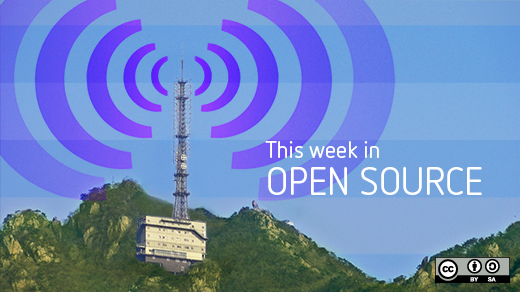In this week's edition of our open source news roundup, we take a look at an open source iPad alternative, Creative Commons turning 12, and more!
Open source news for your reading pleasure.
November 22 - 28, 2014
Jolla’s open source tablet raises more than $1 million on Indiegogo
Fully open source tablets haven't had an easy time. Earlier this year, the KDE team pulled the plug on its ambitious Vivaldi tablet. And other open source tablets barely scratched, let alone put a dent, in the market.
A tablet from Finnish startup Jolla might just succeed where others haven't. According to TechCrunch, Jolla raised over $1.2 million in two days at crowdfunding site Indiegogo. The 7-inch tablet has a higher pixel density and costs $150 less than the iPad Mini 3. And it runs Jolla's open source Sailfish OS to boot.
Jolla expects to ship the tablets sometime in the middle of 2015.
12 years of Creative Commons
Another week, another open source anniversary. This time around, Creative Commons turns 12. According to a report from Creative Commons, there are "nearly 900 million openly licensed works—including 300 million photos on Flickr, 34 million articles on Wikipedia, 10 million videos on YouTube".
In addition to millions of websites licensing their content via Creative Commons, 14 countries have made commitments to open education fueled by Creative Commons. It should be interesting to see how Creative Commons grows in the coming years.
Gates Foundation mandating open access for all research it funds
In related news, the Bill and Melinda Gates Foundation announced that as of January 1, 2015 the results of all research it funds must conform to the Foundation's Open Access policy. This means that all publications "Creative Commons Attribution 4.0 Generic License (CC BY 4.0) or an equivalent license" and that "all publications shall be available immediately upon their publication, without any embargo period."
Writing at Boing-Boing, Cory Doctorow points out that "the next move is up to the publishers, many of whom—even those that are open access in name—have policies that conflict with the Gates policy, meaning that they will not be able to publish Gates-funded research as of 2017, unless they change those policies."
Los Angeles is the latest U.S. city to embrace civic innovation labs
Getting citizens more involved in government, at all levels, is a challenge. In the U.S., several organizations have sprung up to match people with government problems for which they can help find solutions. The latest U.S. city to do that is Los Angeles, with its Civic Innovation Lab.
The Lab "brings together a variety of entrepreneurs and innovators across different industries with ordinary citizens who have the best insight into what the city can do differently." The project is currently collecting submissions based on the design challenges it identified a couple of months ago. The winning submissions will be "based on strength of team, scalability, impact, and city engagement." If you're a civic innovator in the Los Angeles area, this could be your chance to pitch in.
Firefox goes Yahoo!
It's no secret that over the last several years, Mozilla has pulled in much of its revenue from a deal that made Google the default search engine for Firefox. That's set to change, thanks to a five-year partnership that Mozilla inked with Yahoo!
Yahoo! search becomes the default for users of Firefox in the U.S. and, according to blog post by Mozilla's CEO, Yahoo! will support Firefox's Do Not Track feature. The financial terms of this partnership have not been revealed. Whether this is a seismic shift in web search or just a faint rumble remains to be seen.
In other news
- ownCloud 7 Enterprise edition breaks cover
- Using open data to make Chicago a better place
- IndieHosters wants to help you take control of your online identity
- CERN frees data collected by the Large Hadron Collider
- How the Weather Channel is using Drupal and the Acquia platform
A big thanks, as always, to staff member Jen Wike Huger and my fellow moderator Robin Muilwijk for their help this week.







1 Comment